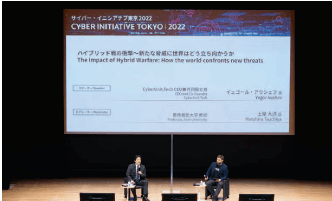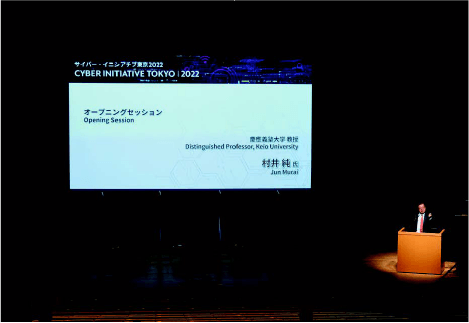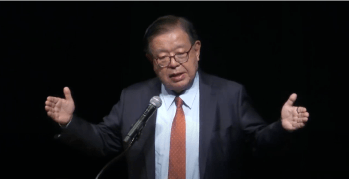| Organizers |
|
||||
| Supporters |
Diamond |

|
|||
|
Platinum |
|
||||
|
Silver |
|
||||
Digital Transformation and Security Strategies Go Hand in Hand Personnel Training Beyond the Industry-Government-Academia Framework is Vital
The opening session on the first day was conducted by Keio University professor Jun Murai, who chaired the Cyber Initiative Tokyo 2022 Steering Committee. Reflecting on the international situation in 2022, Murai commented, “Russia’s invasion of Ukraine had an impact on everyone’s thinking about cyberspace.” Noting that even before the start of the invasion in February 2022, Russia had launched relentless cyberattacks on Ukraine’s electric power grid, he added, “In a society so dependent on the internet, nearly everything is happening in cyberspace. Consequently, more and more people are appreciating the vital importance of cybersecurity.”
Cyberattacks have become a serious threat in Japan. Expanding on his thoughts, Murai stated, “The key factor underlying the rapid increase in cyberattacks targeting Japanese companies is the growth in internet use due to the promotion of digital transformation.” He added, “Now that the whole of society is digitalizing, all stakeholders need to recognize the threat of cyberattacks. It is essential that we try to build a safe and secure digital society, through organizers across industries and companies, large and small.”

The scope of security knowledge and skills required for key security positions and responsibilities is expanding
Companies in Japan are generally considered to be less conscious of security issues than in the West. In recent years, though, a growing number of Japanese companies have positioned security as a part of their security management strategy, from the viewpoint of business continuity.
After this opening session, there was session titled “Ensuring Economic Security and Cyber Strategy in a Fragmented World” featuring Jun Osawa, Senior Research Fellow at the Nakasone Peace Institute and Adjunct Research Fellow at Sasakawa Peace Foundation; Mitsunobu Koshiba, Vice Chairman of the Japan Association of Corporate Executives and Chairman Emeritus of JSR Corporation; Ikuo Misumi, Professor and Dean of the Tokai University School of Information and Telecommunication Engineering; and Yuichi Kuramoto, Partner, Consulting & System Integration, IBM Security, IBM Japan. The discussions on the impacts of “intensifying technological competition due to the US-China confrontation,” “the supply chain vulnerabilities and cyberspace dependence brought to light by the COVID-19 pandemic,” and “the invasion of Ukraine,” were moderated by Hideo Ishizuki, Ambassador in Charge of International Security and Cyber Policy and Deputy Assistant Minister, Foreign Policy Bureau, Ministry of Foreign Affairs.
Ishizuki noted, “Now that the scope of security is expanding into economic and technological areas, ensuring economic security and cyberspace safety are issues of the highest priority.” On this point, Kuramoto stated, “The range of knowledge required for key security posts has expanded.” He elaborated as follows.
“If you want information about a particular company, instead of stealing it through a cyberattack, a more direct approach would be to buy out the company. It is essential to implement comprehensive crisis management, based on a clear understanding of IT-related risks by the Chief Information Officer (CIO) and Chief Information Security Officer (CISO).”
Tackling cybersecurity with the trinity of “prevention,” “discovery,” and “recovery”
According to several research organizations, Russian cyberattacks on Ukraine began in 2010. However, since early 2022 there has been an upsurge in malware attacks on critical infrastructure. The invasion of Ukraine is a form of “hybrid warfare” combining conventional forces and cyberattacks. How is Ukraine standing up to these threats? The first session on the second day featured Yegor Aushev, CEO and co-founder of CyberUnit Tech, who made an urgent visit to Japan from Ukraine. Aushev took the stage to answer questions from Motohiro Tsuchiya, a professor at Keio University, and talk about the state of war in cyberspace.
Aushev is a leading Ukrainian cybersecurity expert who has established multiple cybersecurity companies in his career. Immediately following the military invasion by Russia, he collaborated in the organization of a “Ukraine IT Army” to take on the Russian military.
Aushev explained, “President Zelenskyy is actively involved in IT reform. Straight after his inauguration, he positioned IT as one of the country’s key industries.” Ukraine boasts over 100 universities and approximately 200,000 IT engineers. Within a week of the invasion by Russia, the Ukraine IT Army put together a team of IT experts from home and abroad. “Every day is a hackathon for us,” Aushev said.
A distinctive feature of this hybrid warfare is the cognitive warfare unleashed by the Russian military immediately after the initial invasion. Using AI, it attempted to confuse the Ukrainian public through deep fakes and the manipulation of information. “However,” Aushev contended, “there are many different communities in Ukraine, both public and private, which are working together to monitor disinformation and provide the public with accurate information. The Russian strategy has utterly failed.”
The Ukraine IT Army is reportedly managed through a collaboration between the government, private sector and volunteers. Thinking back, Aushev commented, “If someone had come forward as a commander-in-chief and said, ‘everyone must do what I say,’ the initiative wouldn’t have succeeded.”
A major target of the recent invasion is critical infrastructure. Killnet, a pro-Russian hacktivist group, regards not only Ukraine but also allied Western countries as supporters of international conflicts, so it has launched cyberattacks against critical infrastructure in all these countries on a continuous basis.
A discussion titled “Critical Infrastructure in Danger: How to Stand Up to Cyberattacks” featured panelists Kohei Sato, a partner at Deloitte Tohmatsu Cyber; Masakatsu Morii, a professor at the Kobe University Graduate School of Engineering; Akira Saka, CISO of the Digital Agency; and John Nobel, Non-Executive Director, NHS Digital, and former director of the U.K.’s National Cyber Security Centre (NCSC) (pre-recorded talk). The panel discussion, focused on what measures should be taken to counter cyberattacks that large organizations are suspected to be involved in, was moderated by Tetsushi Yoshikawa, Deputy Director-General of the National Center of Incident Readiness and Strategy for Cybersecurity, Cabinet Secretariat.
Sato of Deloitte Tohmatsu explained that about 70% of ransomware infection pathways in the first half of 2022 involved SSL (Secure Sockets Layer) VPNs. “The introduction of online work during the COVID-19 pandemic caused a massive expansion in attack surfaces. Consequently, companies must thoroughly manage all devices connected to the internet,” he pointed out. He went on to warn, “Japanese companies focus their security measures on ‘prevention’ to stave off intrusion, but this approach can only prevent a small proportion of attacks. It is therefore important to combine ‘prevention’ with ‘discovery,’ which assumes that intrusions are inevitably occurring, and ‘recovery,’ which enables quick recovery after an incident, as a set of three elements.”

The creeping danger of “hack now, decrypt later” attacks as quantum computing becomes imminent
Cyber Initiative Tokyo 2022 also featured a session on the future of cybersecurity, titled “Evolution of Technology and the Future of Cyber Security.” Tomoo Yamauchi, Director-General in charge of Cyber Security and CISO, Ministry of Internal Affairs and Communications moderated the discussion between Yuichi Kuramoto of IBM Japan, Atsuto Suyama, Chief Technology Officer (CTO) of BOLDLY, and Shigehiro Hori, president of Space Compass, on the relationship between the latest technology and cybersecurity.
Cybersecurity is a constant battle with attackers. It has been pointed out that particularly once quantum computers are widely available, current encryption technology will be no match for hackers. Kuramoto explained, “Although the emergence of quantum computers is considered some way off yet, there is still a danger of ‘hack now, decrypt later’ cyberattacks, in which encrypted data is collected now to be decrypted later when available quantum computers are powerful enough. Rather than ignoring the need to address this risk, because quantum computing is still not possible today, it is vital to start preparing for such attacks now, by deploying measures such as quantum-resistant cryptography.”
Finally, for the discussion titled, “A Secure Society Created by Everyone: Roles and Responsibilities of Industry, Government, Academia, and Individuals,” focused on security personnel development and diversity, the panelists were Yuma Kurogome, Director and CTO of Ricerca Security; Kana Shinoda, CEO of Blue; Hisamichi Okamura, attorney and visiting professor at the National Institute of Informatics; and Asako Iwanaga, Managing Director at Deloitte Tohmatsu Cyber. The consensus view that emerged was that to develop the human resources needed for cybersecurity, it is necessary to go beyond the traditional boundaries of industry, government and academia.






